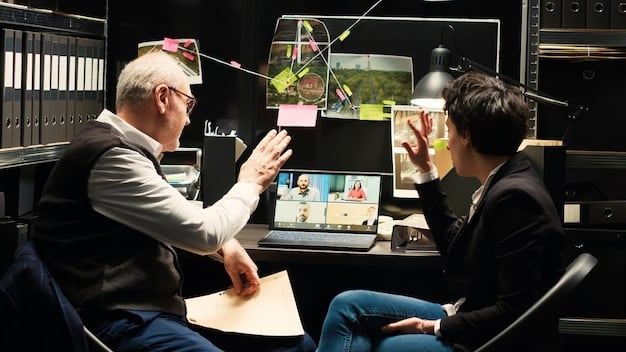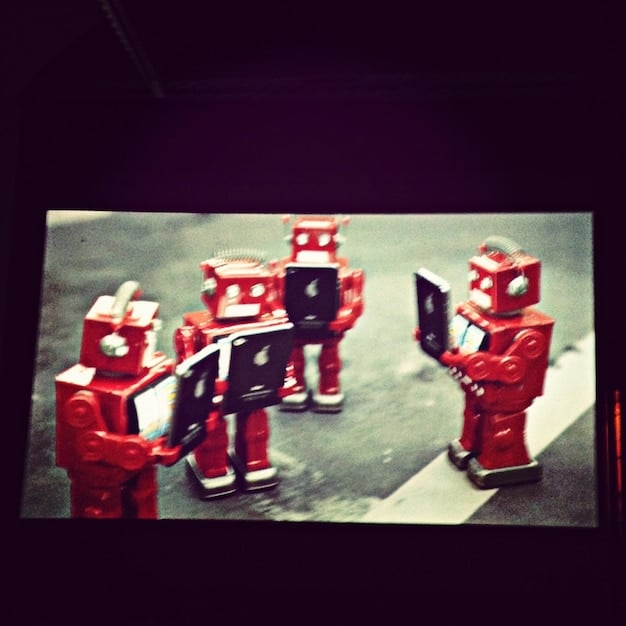The Future of Movie Reviews: How AI Will Change Film Criticism

The Future of Movie Reviews: Will AI Change How We Judge Films? explores the evolving landscape of film criticism, examining how artificial intelligence is poised to reshape traditional methods of evaluating movies, potentially impacting both critics and audiences.
The landscape of film criticism is on the cusp of a significant transformation. The question of the future of movie reviews: will AI change how we judge films? is no longer a matter of if, but when and how this technological shift will unfold, affecting everything from the way critics work to the choices audiences make.
The Rise of AI in Entertainment
Artificial intelligence has already begun making inroads into various aspects of the entertainment industry. From scriptwriting assistance to creating special effects and even generating entire scenes, AI’s capabilities are expanding rapidly. It’s only natural that the realm of movie reviews would be next on the horizon.
AI algorithms can process vast amounts of data, including viewer sentiments from social media, box office numbers, and plot synopses, to generate a review. This raises questions about the objectivity, nuance, and human touch that have traditionally defined film criticism.
AI’s Analytical Capabilities
AI’s capability to crunch numbers and analyze patterns surpasses that of human critics. This ability can lead to reviews based on pure data, potentially altering what factors are considered most important in evaluating a film.
Emotional Quotient
However, the question remains whether AI can truly capture the emotional and subjective experience of watching a movie. Can an algorithm comprehend the artistry, performances, and thematic depth that make a film resonate with audiences? This is a debate that will continue to shape the evolution of AI in film criticism.
- Speed and Volume: AI can generate reviews far faster and more frequently than human critics.
- Data-Driven Insights: Algorithms can identify trends and audience preferences with greater accuracy.
- Potential for Bias: AI systems are trained on existing data, which might reflect the biases present in that data.
Ultimately, the integration of AI into entertainment poses both opportunities and challenges. As AI technology continues to advance, it’s crucial to consider its effects on creativity, originality, and the very essence of human expression in the arts.

Objectivity vs. Subjectivity: The Core Debate
One of the central tensions in film criticism revolves around the concepts of objectivity and subjectivity. Traditional movie reviews often blend elements of both, but AI introduces a new dimension to this debate. Here’s how the two compare when applied.
While human critics bring personal experience and emotional intelligence to bear, AI attempts to offer a more detached, data-driven perspective. But does detaching emotion truly create a better review?
Can AI Be Truly Objective?
AI’s reliance on data might suggest that its reviews will be more objective. However, any AI system is trained on data that may contain biases, and the algorithms themselves can inadvertently perpetuate these biases.
The Importance of Human Perspective
While AI may offer a fresh perspective, the human element should not be discounted. A human critic can bring cultural context, lived experience, and an appreciation for the artistry of filmmaking.
- Interpretive Nuance: Human critics can provide interpretations that AI may overlook.
- Emotional Connection: The human touch is integral to understanding the movie’s emotional impact.
- Authenticity: Bias could always result from the data-sets used to train the AI.
In the end, some argue that the ideal movie review combines the data prowess of AI with the narrative of a human critic. The key takeaway is for humans and AI to work together to provide film reviews.
The Evolving Role of Human Film Critics
As AI takes on some of the traditional tasks of movie reviewers, the role of human critics is evolving. The future may see critics focusing more on contextual, interpretative, and analytical work, rather than concentrating on simple assessments of whether a film is “good” or “bad.”
Human critics may need to adapt and change with technology to be effective in the future. But that does not mean humans will be completely phased out.
More Than Just a Rating
Rather than providing a simple rating, critics could delve deeper into the cultural, social, and artistic significance of films. This would provide value that AI may not be able to replicate.
Curatorial and Guiding Roles
Critics could serve as guides in the ever-expanding landscape of film, curating lists, leading discussions, and offering personalized recommendations. These options would provide the human element audiences may be looking for.
- Thought Leadership: Critics can shape the discourse around film and influence public opinion.
- Advocacy: Human critics can champion underappreciated films and filmmakers.
- Mentorship: Veteran critics can guide emerging talent and help shape the future of film.
Human film critics may evolve, but they should not be replaced by AI bots. The human element is what makes the reviews unique and helpful for the audience.

The Impact on Independent and Niche Films
One of the potential benefits of AI in movie reviews is its ability to provide coverage for independent and niche films that might otherwise be overlooked. Human critics often concentrate on mainstream releases, leaving smaller films struggling for attention.
AI could democratize film criticism to some extent, bringing attention to movies that may be ignored by critics. More views on the film, may result in more sales.
Leveling the Playing Field
Independent filmmakers could use AI-generated reviews to gain visibility and legitimacy, helping their films reach a wider audience.
Discovering Hidden Gems
AI algorithms could identify films with strong artistic merit or unique storytelling that might not appeal to a broad audience but could resonate with a specific niche.
- Diversity: AI can help audiences explore films from different cultures and perspectives.
- Accessibility: AI-generated reviews can be more readily available and accessible to a global audience.
- Awareness: Niche films can benefit from the additional exposure that AI reviews provide.
Thus, AI-based film reviews can help independent and niche films gain more recognition. These films, may be ones that the reviewer may have overlooked.
Ethical Considerations and Challenges
Integrating AI into movie reviews comes with its own set of ethical considerations and challenges. These encompass issues of transparency, bias, accountability, and authenticity. Each must be carefully examined to ensure that AI enhances rather than diminishes film criticism.
Addressing concerns must be a priority, to allow viewers to trust both the reviewer and the film. Here are how those concerns may present themselves.
Transparency in AI-Generated Reviews
Viewers need to be aware that a review has been generated by AI. Full transparency is required to ensure credibility.
Avoiding Bias and Manipulation
AI algorithms can be trained on data that includes biases. This ultimately skews the perspective in the resulting review.
- Accountability: Who is responsible for the content and accuracy of an AI-generated review?
- Authenticity: Can AI truly replicate the nuanced perspective of a human critic?
- Objectivity: AI reviews should be reviewed to make sure bias and manipulation did not occur.
Before AI takes over the film review industry, ethical considerations should be explored, documented, and agreed upon. Transparency, bias, accountability, and authenticity must be considered so the viewer can trust these reviews.
The Future of Human-AI Collaboration
The most likely future scenario involves collaboration between human and AI. This blend can lead to more insightful, balanced, and comprehensive movie reviews. Human critics can leverage AI tools to enhance their research, identify patterns, and gain fresh perspectives, while still retaining their unique voice and analytical skills.
One complements the other in many ways, which may result in more accurate and trustworthy reviews.
Augmented Analysis
AI tools can assist human critics by automating tasks such as data gathering, sentiment analysis, and fact-checking, freeing them to focus on more creative analysis.
Diverse Perspectives
AI can analyze reviews from multiple sources and perspectives, presenting human critics with a more well-rounded view of a film’s reception.
- Enhanced Insights: Human-AI collaborations can lead to deeper, more nuanced understandings of film.
- Greater Efficiency: Critics can produce higher-quality reviews in less time.
- Adaptability: Critics can continuously refine their approach as AI technology evolves.
Human and AI collaboration is likely the best option for film reviews. One empowers the other, resulting in trustworthy and relevant content for film viewers.
| Key Point | Brief Description |
|---|---|
| 🤖 AI in Analysis | AI assists with data processing and identifying film trends. |
| ✍️Human Critique | Provides emotional depth & contextual understanding. |
| ⚖️ Ethical Concerns | Important to consider transparency, bias, and authenticity. |
| 🤝 Collaboration | Combining human expertise with AI enhances review quality. |
FAQ
▼
It’s unlikely that AI will completely replace human film critics. More likely, AI will augment their work by automating data analysis and spotting trends, allowing critics to focus on interpretations and contextual insights.
▼
AI could enhance review quality by providing data-driven insights and broadening coverage. However, it might also flatten the reviews by reducing nuance and emotional depth, unless it’s paired with human insight.
▼
Yes, there are. Transparency is critical: disclosing AI involvement and eliminating bias. It’s also imperative to maintain accountability to ensure the reviews remain authentic, reliable, and ethically sound for viewers.
▼
Human critics will probably shift toward more in-depth analysis, cultural commentary, curatorial work, and providing personalized recommendations. Human perspective and emotional understanding remain invaluable in the age of AI.
▼
AI can potentially boost inclusivity by casting a wider net in film selection and analyzing films from various cultures that human critics might overlook. This could lead to a richer variety of films gaining attention.
Conclusion
The future of movie reviews will likely be a collaborative effort between artificial intelligence and human critics, blending data-driven insights with emotional, cultural, and artistic understanding. Such teamwork has the potential to enrich, broaden, and democratize the art of film criticism.





